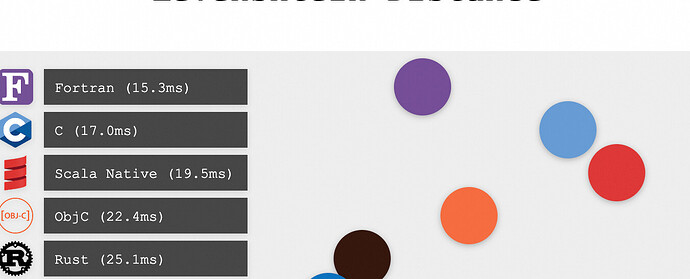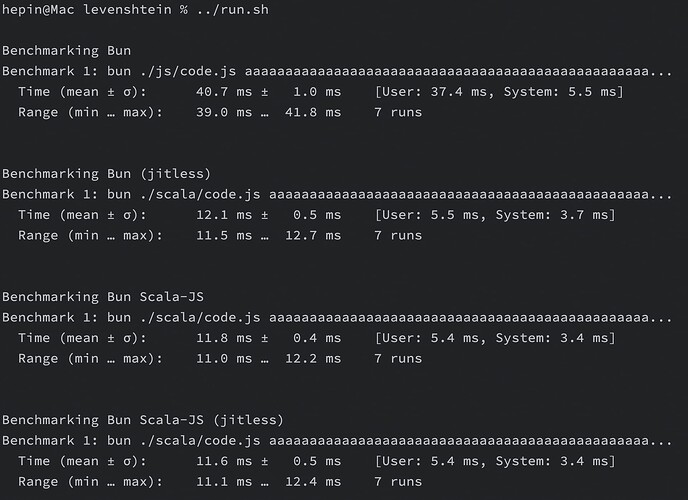When I looked at the code of
https://benjdd.com/languages3/
Scala-Native is fast, but Scala on the JVM is slow
: Unit = {
val (str1, str2) = if (s1.length > s2.length) (s2, s1) else (s1, s2)
}
}
and the bytecode shows:
// access flags 0x1
public method(Ljava/lang/String;Ljava/lang/String;)V
// parameter final s1
// parameter final s2
L0
LINENUMBER 11 L0
ALOAD 1
INVOKEVIRTUAL java/lang/String.length ()I
ALOAD 2
INVOKEVIRTUAL java/lang/String.length ()I
IF_ICMPLE L1
NEW scala/Tuple2
DUP
ALOAD 2
ALOAD 1
INVOKESPECIAL scala/Tuple2.<init> (Ljava/lang/Object;Ljava/lang/Object;)V
GOTO L2
L1
FRAME SAME
NEW scala/Tuple2
DUP
ALOAD 1
ALOAD 2
INVOKESPECIAL scala/Tuple2.<init> (Ljava/lang/Object;Ljava/lang/Object;)V
L2
FRAME SAME1 scala/Tuple2
ASTORE 5
ALOAD 5
IFNULL L3
ALOAD 5
INVOKEVIRTUAL scala/Tuple2._1 ()Ljava/lang/Object;
CHECKCAST java/lang/String
ASTORE 6
L4
ALOAD 5
INVOKEVIRTUAL scala/Tuple2._2 ()Ljava/lang/Object;
CHECKCAST java/lang/String
ASTORE 7
L5
NEW scala/Tuple2
DUP
ALOAD 6
ALOAD 7
INVOKESPECIAL scala/Tuple2.<init> (Ljava/lang/Object;Ljava/lang/Object;)V
GOTO L6
L3
FRAME APPEND [T T scala/Tuple2]
GOTO L7
L7
FRAME SAME
NEW scala/MatchError
DUP
ALOAD 5
INVOKESPECIAL scala/MatchError.<init> (Ljava/lang/Object;)V
ATHROW
L6
FRAME FULL [com/alibaba/ultramax/mtop/jsonpath/Test$ java/lang/String java/lang/String T T scala/Tuple2 java/lang/String java/lang/String] [scala/Tuple2]
ASTORE 4
ALOAD 4
INVOKEVIRTUAL scala/Tuple2._1 ()Ljava/lang/Object;
CHECKCAST java/lang/String
ASTORE 8
L8
ALOAD 4
INVOKEVIRTUAL scala/Tuple2._2 ()Ljava/lang/Object;
CHECKCAST java/lang/String
ASTORE 9
L9
RETURN
L10
LOCALVARIABLE str1 Ljava/lang/String; L4 L3 6
LOCALVARIABLE str2 Ljava/lang/String; L5 L3 7
LOCALVARIABLE str1 Ljava/lang/String; L8 L10 8
LOCALVARIABLE str2 Ljava/lang/String; L9 L10 9
LOCALVARIABLE this Lcom/alibaba/ultramax/mtop/jsonpath/Test$; L0 L10 0
LOCALVARIABLE s1 Ljava/lang/String; L0 L10 1
LOCALVARIABLE s2 Ljava/lang/String; L0 L10 2
MAXSTACK = 4
MAXLOCALS = 10
I think when the tuple is only used for switch variables, it should be compiles to simple if else block.
object Test {
def method(s1: String, s2: String): Unit = {
val isS1Bigger = s1.length > s2.length
val str1 = if (isS1Bigger) s2 else s1
val str2 = if (isS1Bigger) s1 else s2
}
}
which gets:
// access flags 0x1
public method(Ljava/lang/String;Ljava/lang/String;)V
// parameter final s1
// parameter final s2
L0
LINENUMBER 11 L0
ALOAD 1
INVOKEVIRTUAL java/lang/String.length ()I
ALOAD 2
INVOKEVIRTUAL java/lang/String.length ()I
IF_ICMPLE L1
ICONST_1
GOTO L2
L1
FRAME SAME
ICONST_0
L2
FRAME SAME1 I
ISTORE 3
L3
LINENUMBER 12 L3
ILOAD 3
IFEQ L4
ALOAD 2
GOTO L5
L4
FRAME APPEND [I]
ALOAD 1
L5
FRAME SAME1 java/lang/String
ASTORE 4
L6
LINENUMBER 13 L6
ILOAD 3
IFEQ L7
ALOAD 1
GOTO L8
L7
FRAME APPEND [java/lang/String]
ALOAD 2
L8
FRAME SAME1 java/lang/String
ASTORE 5
L9
RETURN
L10
LOCALVARIABLE isS1Bigger Z L3 L10 3
LOCALVARIABLE str1 Ljava/lang/String; L6 L10 4
LOCALVARIABLE str2 Ljava/lang/String; L9 L10 5
LOCALVARIABLE this Lcom/alibaba/ultramax/mtop/jsonpath/Test$; L0 L10 0
LOCALVARIABLE s1 Ljava/lang/String; L0 L10 1
LOCALVARIABLE s2 Ljava/lang/String; L0 L10 2
MAXSTACK = 2
MAXLOCALS = 6
There is a asm method for this:
public void swap(Type prev,
Type type)
Generates the instructions to swap the top two stack values.

